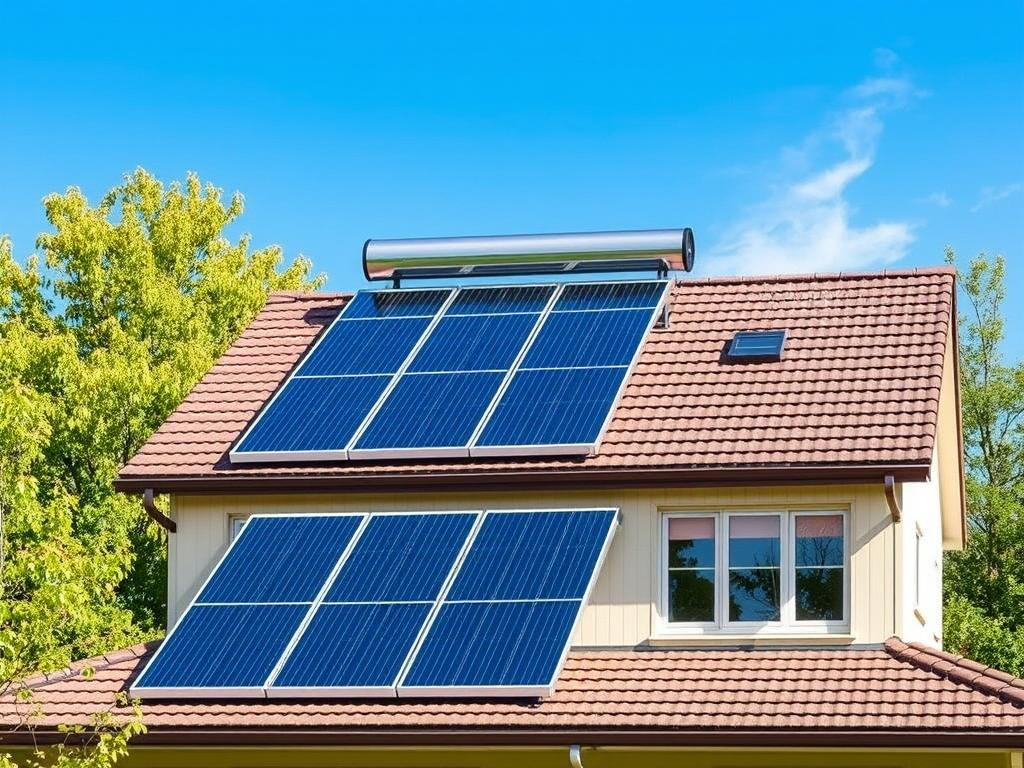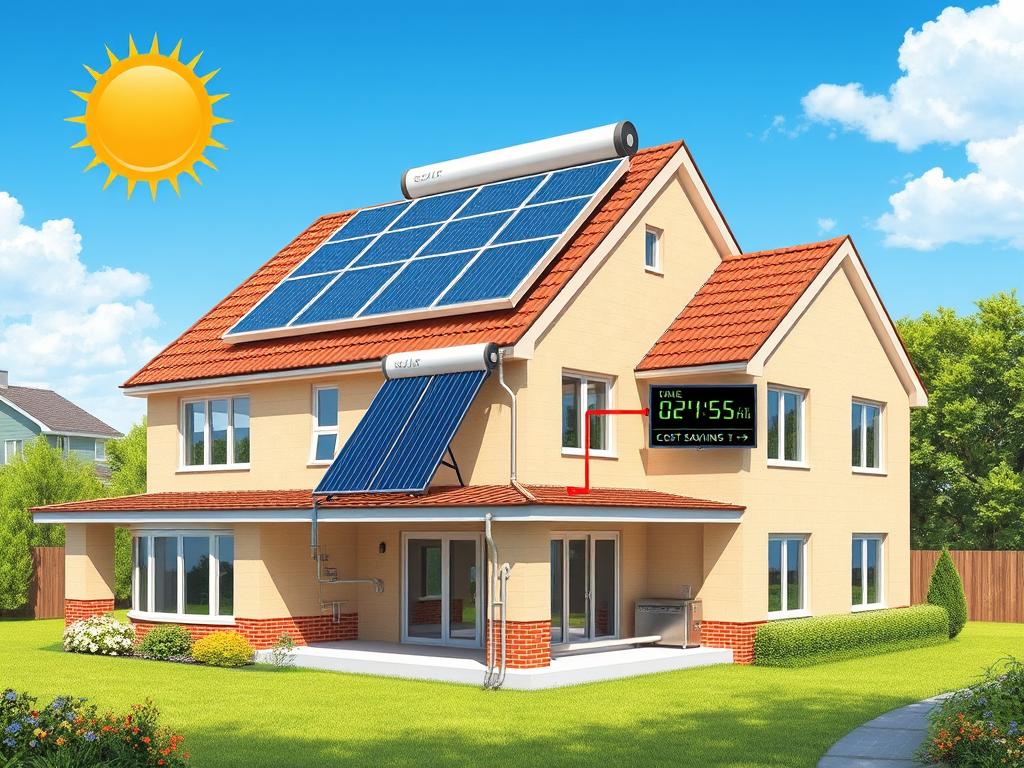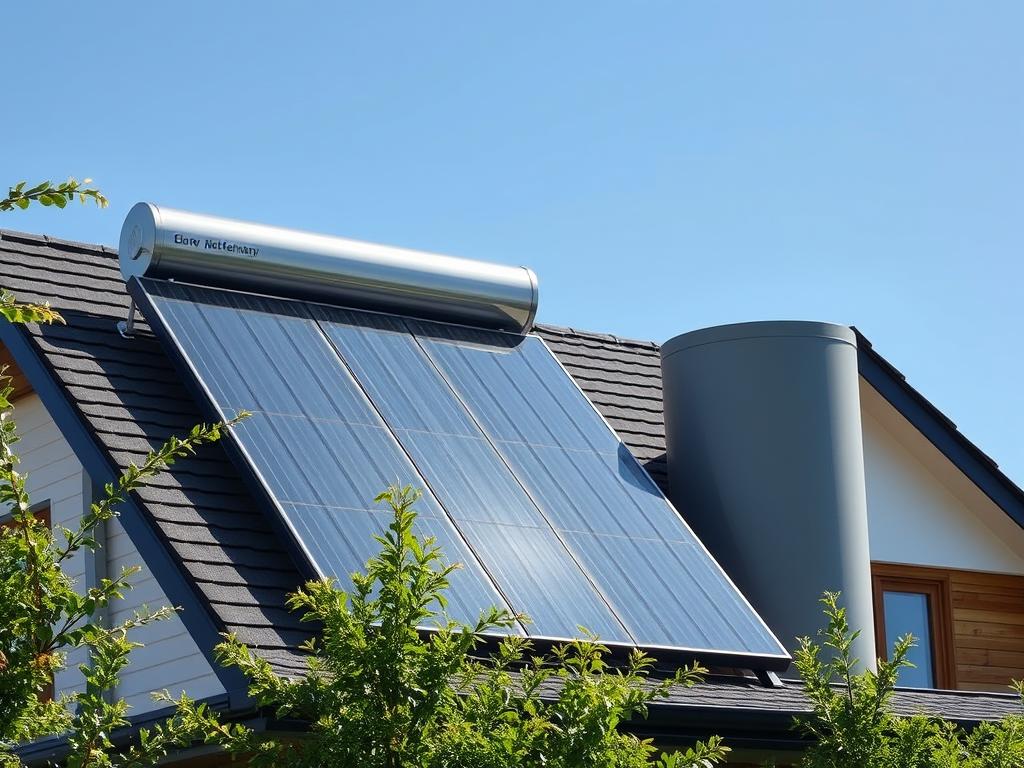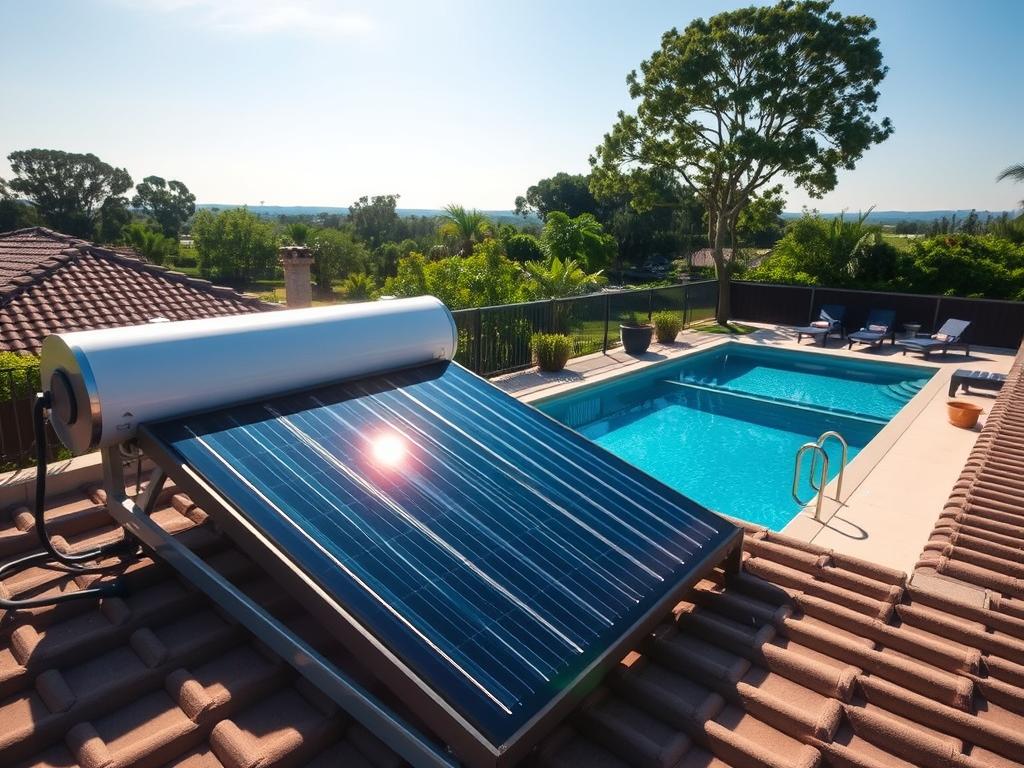Solar water heaters use sunlight to heat water. They are good for the planet and can save money on bills. These systems have solar panels that catch sunlight and turn it into heat.
This heat is then used to warm water or a special liquid. The warm liquid is stored in a tank. This way, large homes can have hot water all the time.
Key Takeaways
- Solar water heaters use sunlight, which is free. This makes them a cost-effective way to get hot water.
- Big homes can really benefit from solar water heaters. They are high-capacity and save energy.
- There are two main types of solar water heaters. Each has its own good points and not-so-good points.
- It’s important to get the right size and have it installed by experts. This ensures it works well and saves money over time.
- Using a solar water heater can cut down on water heating costs a lot. It might even pay for itself eventually.
Understanding Solar Water Heating Systems Basics
Solar water heating systems use the sun’s power to heat your home’s water. They are a great choice for those who want to be eco-friendly. These systems have solar collectors and storage tanks. They come in two main types: active and passive.
Active systems use pumps and controls to move heated water. They are split into direct and indirect circulation types. Passive systems use natural convection, without pumps. This makes them cheaper but less efficient.
Most solar water heaters need a backup system. This is for cloudy days or when you need more hot water. It makes sure your family always has hot water, even when it’s not sunny.
| System Type | Key Characteristics |
|---|---|
| Flat-Plate Collectors | – Typically sized to contain 40 gallons of water – Two collectors can provide about half the hot water for a family of four |
| Evacuated Tube Collectors | – Highly efficient and can operate in temperatures as low as -40°F – Can work well even in overcast conditions – Can cost twice as much per square foot as flat-plate collectors |
Learning about solar water heating systems helps you choose the right one for your solar-powered family dwelling. You’ll enjoy eco-friendly water heating for many years.
Types of Solar Water Heaters for Large Family Homes
There are many types of solar water heaters for big homes. Active systems use electric pumps to move water. Passive systems use natural flow.
Flat-plate collectors are simple and cost-effective. They work well for homes with enough roof space. Evacuated-tube collectors are efficient in cold areas.
Integral Collector-Storage (ICS) systems are easy and simple. But, they might not work well on cloudy days. Thermosiphon systems are reliable but need careful setup.
Direct circulation systems are efficient but can freeze in cold weather. Indirect systems use antifreeze and work well in cold areas. They are more complex and expensive.
Hybrid systems mix solar and traditional heating. They provide hot water all the time. But, they cost more and need regular checks.
Choosing the right solar water heater depends on many things. Climate, water needs, space, and budget are key. Knowing your options helps pick the best one for your home.
Active vs. Passive Solar Water Heating Systems
There are two main types of solar water heating systems for large family homes: active and passive. Knowing the differences helps you choose the right one for your home. This choice depends on your climate, hot water needs, and how you want to install it.
Active systems use pumps to move water or a heat-transfer fluid through collectors. They are more efficient and good for colder climates or big families. Passive systems use natural convection. They are simpler and might be cheaper in some cases.
Active systems can be direct or indirect. Direct systems move your home’s water through collectors. Indirect systems use a fluid that heats your water. Passive systems include integral collector-storage and thermosyphon types, each with its own benefits.
Choosing between active and passive systems depends on your climate, family size, and installation preferences. By understanding each system’s pros and cons, you can pick the best one. This choice will help you get efficient, renewable, and eco-friendly hot water for your home.
Sizing Your Solar Water Heater for Large Family Needs

Choosing the right solar water heater size is key for your family’s needs. It helps with sustainable hot water and saves money in the long run. The size depends on your family’s size, hot water use, and where you live.
Experts say a 20 square feet collector area is good for the first two people in sunny areas. For each more person, add 8 square feet. In cooler areas, add 12-14 square feet for each extra person.
The tank size matters too. A small tank (50-60 gallons) works for one or two people. For three to four, a medium tank (80 gallons) is better. Homes with four to six people might need a bigger tank.
Getting help from a solar water heater expert is smart. They can figure out what you need and suggest the best system for your home.
Cost Analysis and Long-term Savings

Solar water heaters are great for saving money in the long run, especially for big families. They cost more upfront than other systems. But, they save a lot of money over time.
The price of a solar water heater system, including setup, is between $3,000 and $9,000. This is more than the $600 to $3,100 for a regular water heater. But, the savings on energy can pay for the extra cost.
| System Type | Average Cost |
|---|---|
| Solar Water Heater | $3,000 – $9,000 |
| Conventional Water Heater | $600 – $3,100 |
| Tankless Water Heater | $1,400 – $5,600 |
Solar water heaters can cut your water heating bills by 50% to 80%. They use less electricity than regular heaters. This means big savings, especially in places with high electricity costs. Government rebates can also help lower the initial cost.
Solar water heaters are a smart choice for families wanting to save energy and live sustainably. The initial cost is higher. But, the long-term savings and environmental benefits make them worth it.
Installation Requirements and Considerations
Adding a residential solar water heater to your home needs careful planning. You must check your roof’s strength and how it faces the sun. This ensures the solar collector gets enough sunlight. Also, insulating the storage tank and pipes well keeps the system efficient and eco-friendly heating.
The cost to install can vary a lot. It can be between $375 and $750 or more. This depends on the system’s type and local labor costs. Always check local building codes and get the right permits. Also, make sure the installation is safe. Getting help from skilled installers can make this process easier.
It’s key to analyze the site well for your solar water heater to work right. You need to make sure the collector gets direct sunlight without shadows. Also, place it close to the storage tank to save on costs and energy.
Learning about solar hot-water systems helps set the right expectations. Knowing its limits helps use it better. Regular checks for leaks and cleaning the collector are important. They keep the system running well and last longer.
Climate Compatibility and Performance Factors
Understanding climate and performance is key for solar thermal tech. Your solar water heater’s performance changes with your local weather. This affects how well it works for your home.
In sunny places, a simple solar water heater might be enough. But in colder or cloudier areas, you might need a more advanced system. This system should also protect against freezing.
The amount of sunlight, temperature changes, and weather all impact your system’s efficiency. In summer, a good system uses 0.3-1.4 kWh daily. In winter, it might use 1.0-5.8 kWh daily.
Choosing the right solar water heater for your big home is important. Think about the climate and performance to pick the best option. This way, you’ll get the most out of solar thermal technology and low-carbon water heating in your sustainable household.
Maintenance Tips for Optimal Performance
Keeping your energy-efficient water heater in good shape is key. Solar water heaters need little upkeep compared to others. But, regular care helps keep them working well.
Cleaning the solar panels or collectors is a must. Do this often to remove dirt and dust. Also, check for leaks or corrosion on pipes and the tank to avoid big problems.
Get your system checked by a pro every year. This helps catch issues early and keeps your system running smoothly. Some parts, like the pump, might need to be replaced every 10 years.
By following these easy tips, your eco-friendly hot water system will last longer. Taking good care of it means you’ll enjoy energy-saving hot water for many years.
Comparing Top Solar Water Heater Brands
Looking for a solar water heater for your big family home? It’s key to check out the top brands. These heaters cut down on costs and give hot water all year.
The GE 80-gallon hybrid water heater is a top pick for its lasting performance and saving energy. Bradford-White’s RE2HF)S10 50-gallon unit is also highly praised. Rheem offers many solar water heaters for all family sizes.
| Brand | Model | Capacity | Energy Efficiency | Warranty | Average Cost |
|---|---|---|---|---|---|
| GE | GE 80-gallon Hybrid | 80 gallons | High | 10 years | $1,800 – $2,500 |
| Bradford-White | RE2HF)S10 | 50 gallons | Very High | 15 years | $2,000 – $3,000 |
| Rheem | Various Models | 40-80 gallons | High to Very High | 10-15 years | $1,500 – $4,500 |
When picking a solar water heater, look at capacity, energy efficiency, warranty, and customer support. Prices and features differ a lot. So, it’s smart to compare many before choosing the right one for your family and budget.
Environmental Impact and Sustainability Benefits
Solar water heaters are a top choice for eco-friendly heating. They use the sun’s energy, cutting down on carbon emissions. This makes them a key part of sustainable living.
They are better than electric heaters in many ways. A solar water heater can reduce your CO2 emissions by 1,000 to 3,000 pounds each year.
Solar water heaters also support your use of renewable energy. They use the sun’s clean power, reducing your need for fossil fuels. This fits well with your eco-friendly lifestyle.
These heaters are built to last, with a 20-year lifespan. This means you get many years of low-carbon heating. It’s a smart choice for your family and the planet.
When looking for a solar water heater for your home, remember the benefits. Using solar energy helps the environment and supports a sustainable future.
Integration with Existing Home Systems
When looking into solar water heaters for your big family home, think about how they fit with your current systems. These green solutions bring many benefits when paired with your home’s utilities. They help save energy and cut down on costs.
Solar water heaters can work well with your usual water heaters. They act as a preheater, making your main water heater work less. This means your family always has hot water, using less energy from the grid. Some systems even connect with dehumidifiers, making your home more comfortable, especially in damp areas.
| System Integration | Benefits |
|---|---|
| Preheating with Conventional Water Heater | Consistent hot water, reduced energy consumption |
| Dehumidifier Connections | Improved climate control, enhanced comfort |
| Home Automation Linkage | Intelligent monitoring and optimization |
For green home upgrades, it’s important to integrate your solar water heater smoothly with your utilities. Using these eco-friendly solutions, you can save energy and help the planet. Your big family will still enjoy the comfort and convenience they’re used to.
Smart Features and Modern Technology Advances
Solar water heating tech is getting smarter and more advanced. Modern systems now come with smart features and new abilities. These changes make them better at saving energy and easier to use.
Today’s solar water heaters have smart controllers. They adjust energy use based on how much hot water you need. Some even let you control them from your phone. This lets you manage your system from anywhere.
New materials and heat transfer fluids make these systems more efficient and long-lasting. Some systems use machine learning to guess when you’ll need hot water. This means you always have enough without wasting energy.
As solar thermal technology, energy efficiency, renewable water heating, and sustainable hot water solutions improve, they become more appealing. This is especially true for big families.

